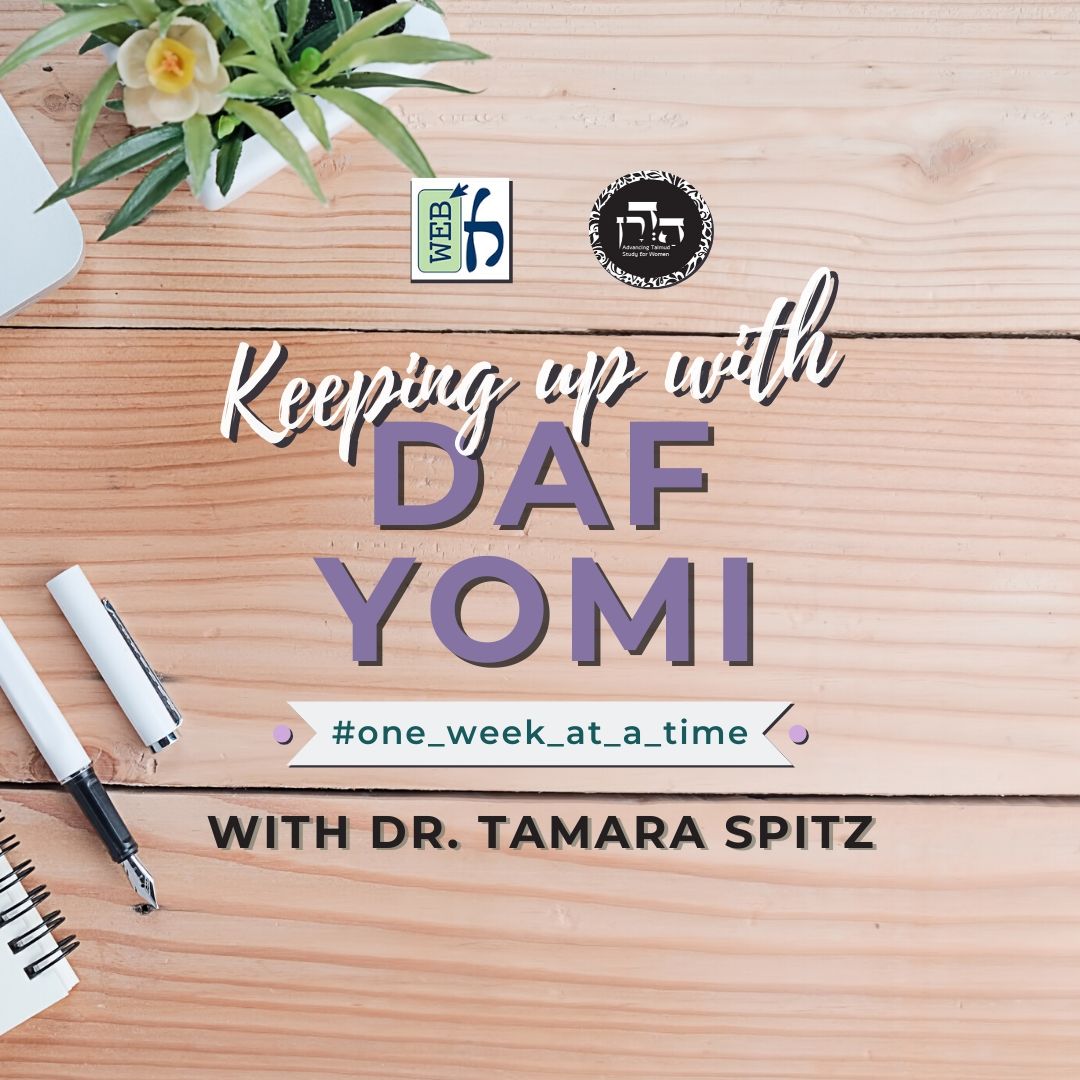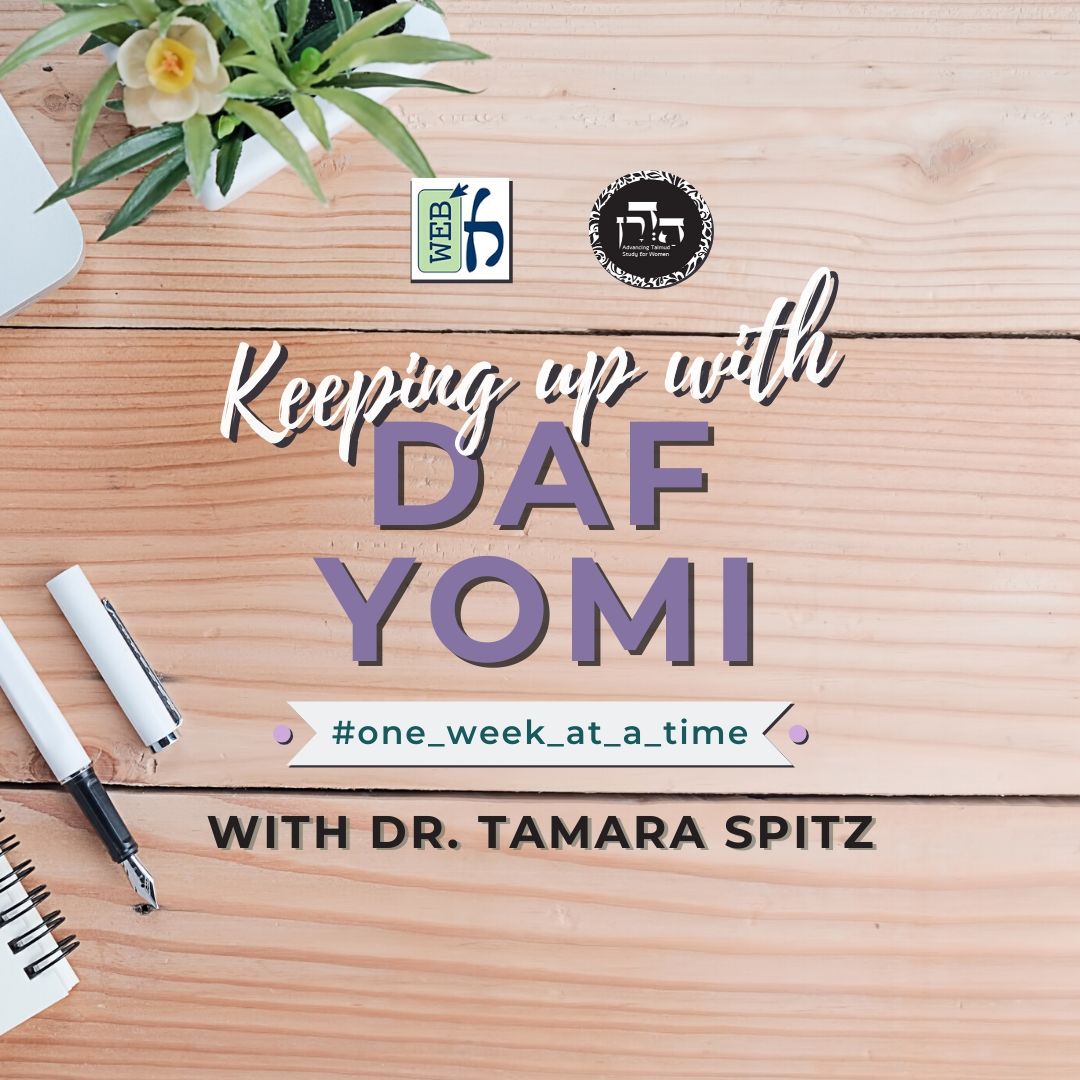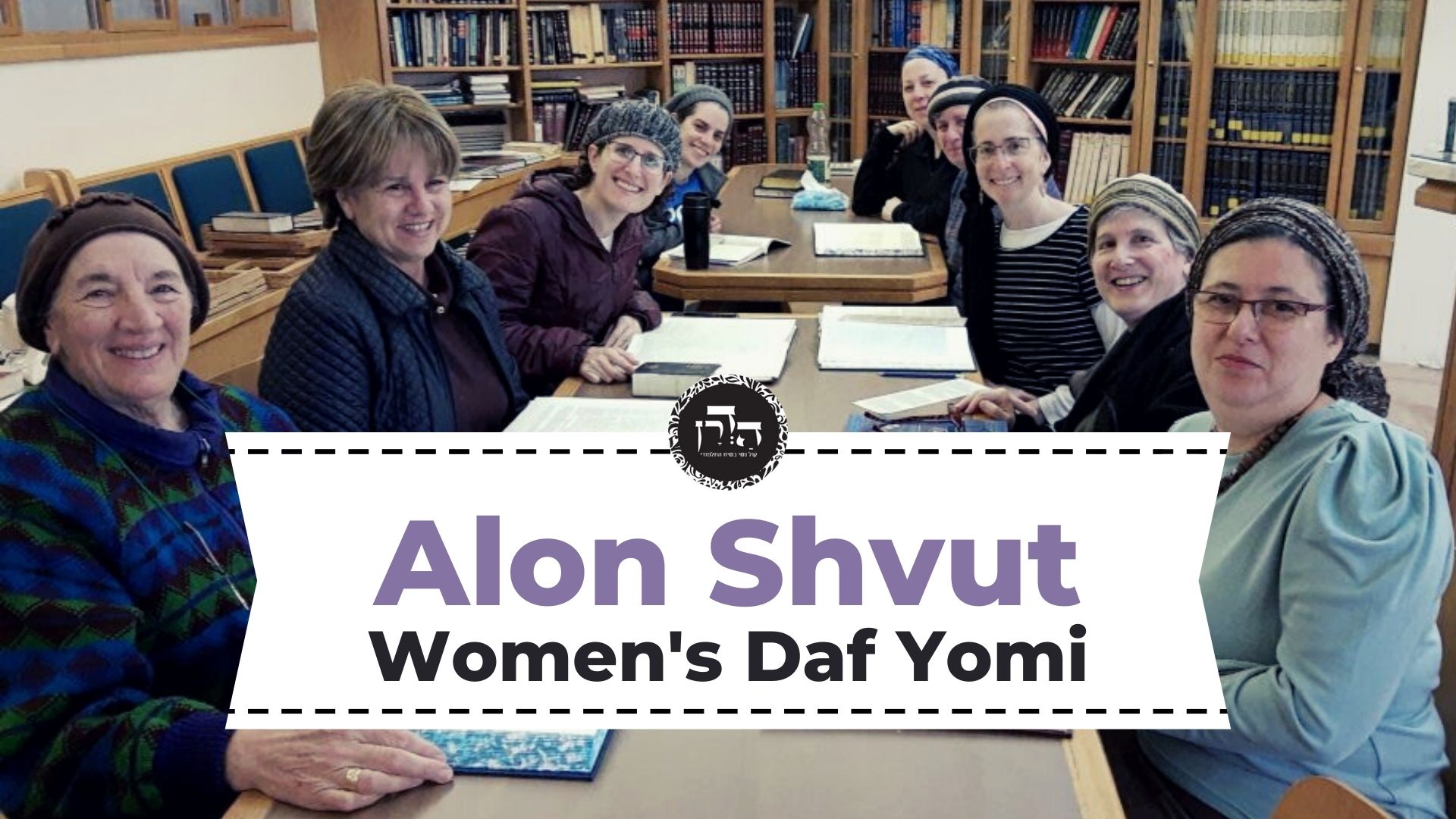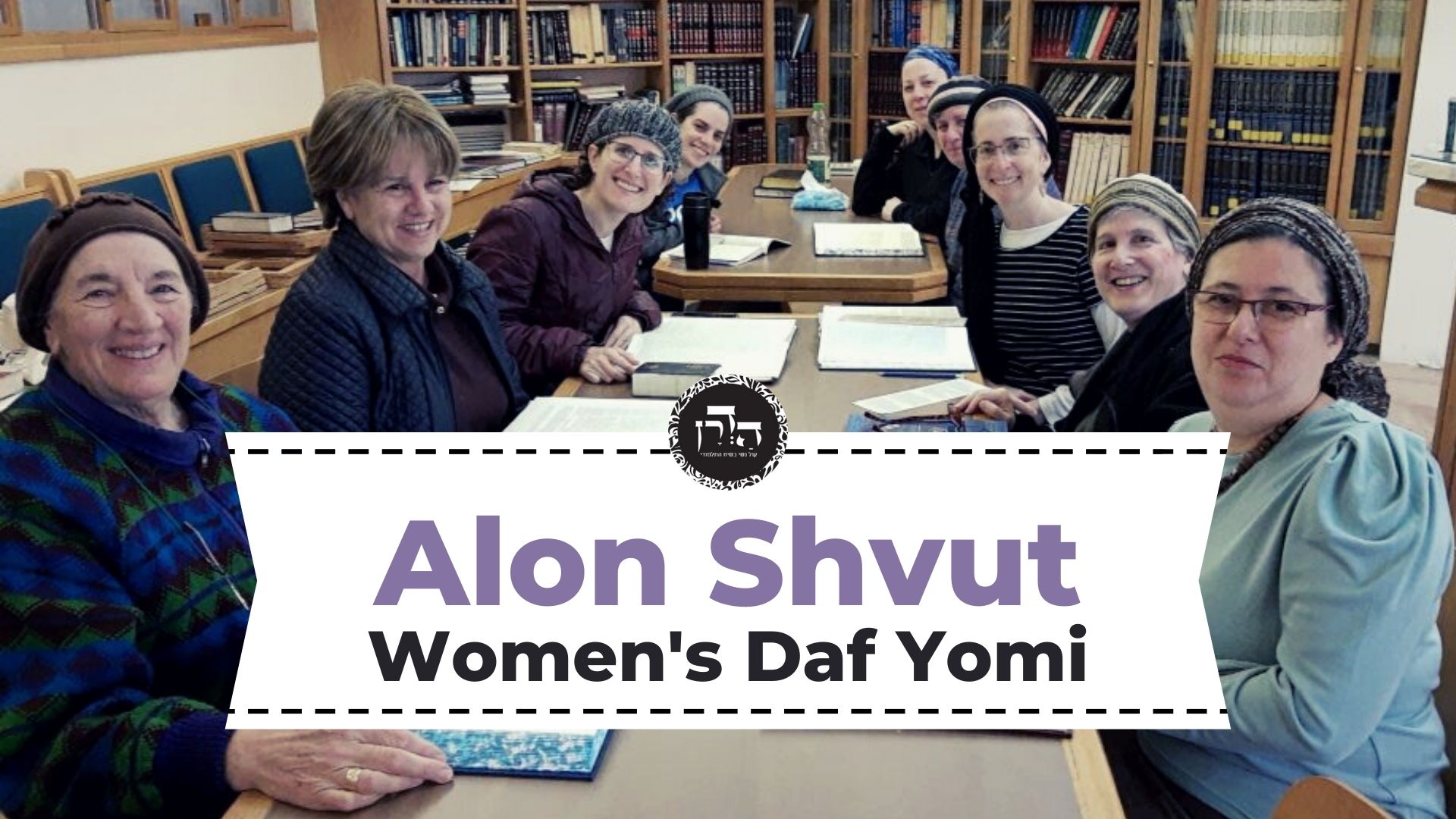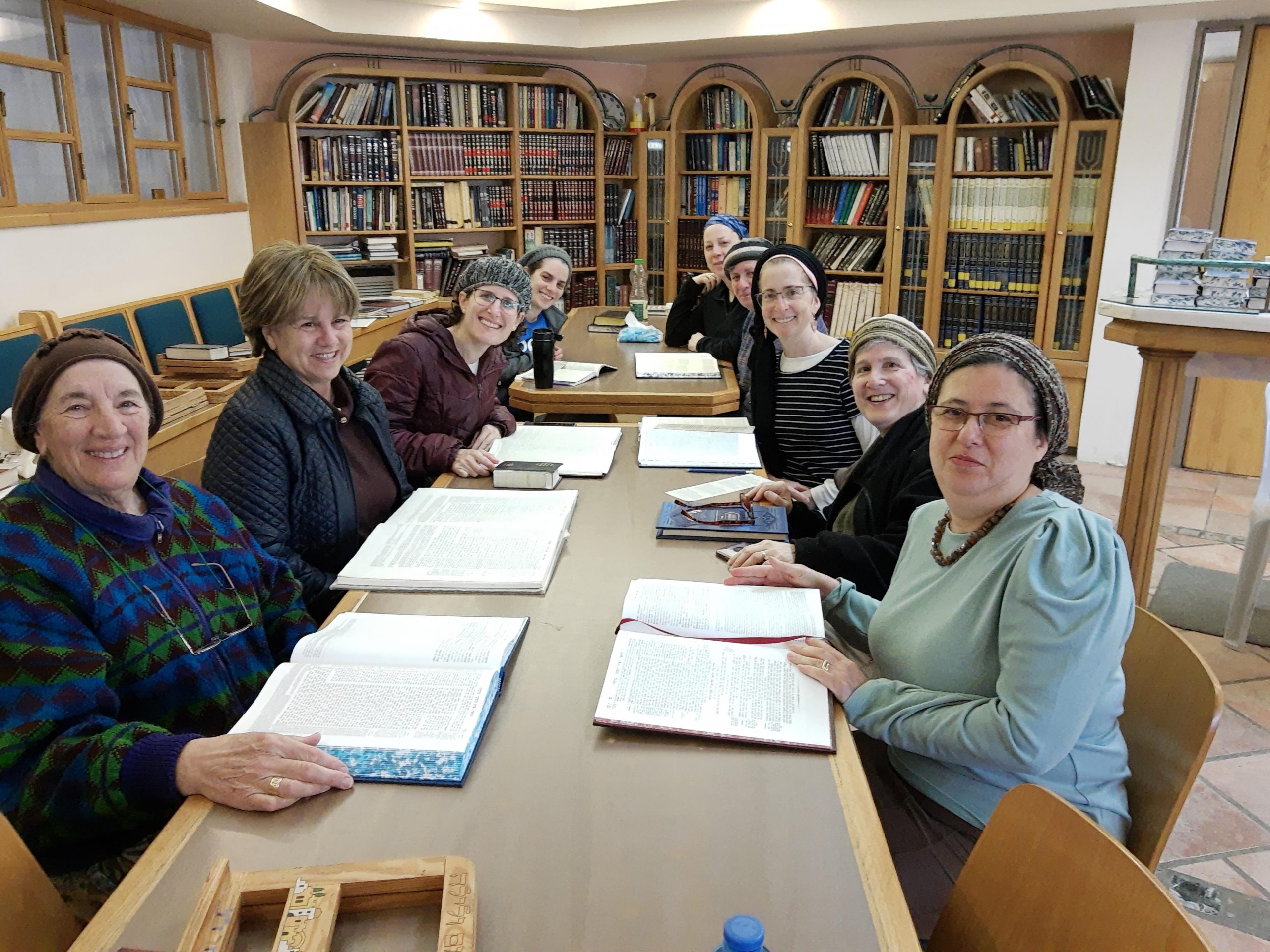If a man converts and already had children – is he newborn son after the conversion considered a firstborn for inheritance laws? Can he fulfill his obligation for having children based on the children he had before he converted? A daughter of a levi – her son is exempt from pidyon haben – is this only if the father was not Jewish or even if he was Jewish? In which cases can the son be a firstborn for inheritance and pidyon haben and in which cases for neither (on this last point there is a debate).
This week’s learning is sponsored for the merit and safety of Haymanut (Emuna) Kasau, who was 9 years old when she disappeared from her home in Tzfat two years ago, on the 16th of Adar, 5784 (February 25, 2024), and whose whereabouts remain unknown.
This week’s learning is dedicated of the safety of our nation, the soldiers and citizens of Israel, and for the liberation of the Iranian people. May we soon see the realization of “ליהודים היתה אורה ושמחה וששון ויקר”.
Want to dedicate learning? Get started here:


Today’s daily daf tools:
This week’s learning is sponsored for the merit and safety of Haymanut (Emuna) Kasau, who was 9 years old when she disappeared from her home in Tzfat two years ago, on the 16th of Adar, 5784 (February 25, 2024), and whose whereabouts remain unknown.
This week’s learning is dedicated of the safety of our nation, the soldiers and citizens of Israel, and for the liberation of the Iranian people. May we soon see the realization of “ליהודים היתה אורה ושמחה וששון ויקר”.
Today’s daily daf tools:
Delve Deeper
Broaden your understanding of the topics on this daf with classes and podcasts from top women Talmud scholars.
New to Talmud?
Check out our resources designed to help you navigate a page of Talmud – and study at the pace, level and style that fits you.
The Hadran Women’s Tapestry
Meet the diverse women learning Gemara at Hadran and hear their stories.
Bekhorot 47
״יַכִּיר״ לְחוּד, וְהַכָּרַת פָּנִים לְחוּד.
The requirement of “He shall recognize” with regard to a firstborn for inheritance, and the recognition of a husband’s face, are discrete matters.
אִיתְּמַר: הָיוּ לוֹ בָּנִים בְּגַיּוּתוֹ וְנִתְגַּיֵּיר — רַבִּי יוֹחָנָן אוֹמֵר: אֵין לוֹ בְּכוֹר לַנַּחֲלָה, וְרַבִּי שִׁמְעוֹן בֶּן לָקִישׁ אוֹמֵר: יֵשׁ לוֹ בְּכוֹר לַנַּחֲלָה. רַבִּי יוֹחָנָן אוֹמֵר: אֵין לוֹ בְּכוֹר לַנַּחֲלָה — דְּהָא הֲוָה לֵיהּ ״רֵאשִׁית אוֹנוֹ״, וְרַבִּי שִׁמְעוֹן בֶּן לָקִישׁ אוֹמֵר: יֵשׁ לוֹ בְּכוֹר לַנַּחֲלָה — גֵּר שֶׁנִּתְגַּיֵּיר כְּקָטָן שֶׁנּוֹלַד דָּמֵי.
§ It was stated that amora’im engaged in a dispute concerning the case of a man who had children when he was a gentile and he subsequently converted: Rabbi Yoḥanan says he does not have a firstborn with regard to inheritance, i.e., a son who is his firstborn after his conversion does not inherit a double portion; and Rabbi Shimon ben Lakish says: He does have a firstborn with regard to inheritance. The Gemara elaborates: Rabbi Yoḥanan says: He does not have a firstborn with regard to inheritance, as this man already had “the first of his strength” (Deuteronomy 21:17), the Torah’s description of the firstborn in this context, before he converted. And Rabbi Shimon ben Lakish says: He does have a firstborn with regard to inheritance, as the halakhic status of a convert who just converted is like that of a child just born.
וְאָזְדוּ לְטַעְמַיְיהוּ, דְּאִיתְּמַר: הָיוּ לוֹ בָּנִים בְּגַיּוּתוֹ וְנִתְגַּיֵּיר — רַבִּי יוֹחָנָן אָמַר: קִיֵּים פְּרִיָּה וּרְבִיָּה, וְרַבִּי שִׁמְעוֹן בֶּן לָקִישׁ אָמַר: לֹא קִיֵּים. רַבִּי יוֹחָנָן אָמַר: קִיֵּים — ״לֹא תֹהוּ בְרָאָהּ לָשֶׁבֶת יְצָרָהּ״, וְרַבִּי שִׁמְעוֹן בֶּן לָקִישׁ אָמַר: לֹא קִיֵּים פְּרִיָּה וּרְבִיָּה — גֵּר שֶׁנִּתְגַּיֵּיר כְּקָטָן שֶׁנּוֹלַד דָּמֵי.
The Gemara comments: And these amora’im follow their regular line of reasoning, as it was stated: If a man had children when he was a gentile and he subsequently converted, Rabbi Yoḥanan says: He has already fulfilled the mitzva to be fruitful and multiply, and Rabbi Shimon ben Lakish says: He has not fulfilled the mitzva to be fruitful and multiply. The Gemara clarifies: Rabbi Yoḥanan says he has fulfilled the aspect of the mitzva to be fruitful and multiply expressed in the command: “He did not create it to be a waste; He formed it to be inhabited” (Isaiah 45:18), i.e., to increase the inhabitation of the world. And Rabbi Shimon ben Lakish says he has not fulfilled the mitzva to be fruitful and multiply, as the halakhic status of a convert who just converted is like that of a child just born, and it is considered as though he did not have children.
וּצְרִיכָא, דְּאִי אִיתְּמַר בְּהָא קַמַּיְיתָא, בְּהָא קָאָמַר רַבִּי שִׁמְעוֹן בֶּן לָקִישׁ, מִשּׁוּם דִּבְגַיּוּתָן לָאו בְּנֵי נַחֲלָה נִינְהוּ, אֲבָל בְּהָא אֵימָא מוֹדֶה לֵיהּ לְרַבִּי יוֹחָנָן, דְּ״לֹא תֹהוּ בְּרָאָהּ לָשֶׁבֶת יְצָרָהּ״, וְהָא עֲבַד לֵיהּ שֶׁבֶת.
The Gemara adds: And it is necessary to state their opinions in both cases. As, if it were stated only in that first case with regard to inheritance, perhaps it is only in that case that Rabbi Shimon ben Lakish says his opinion that the first son born after conversion inherits a double portion, because in their gentile state they are not subject to the halakhot of inheritance. But with regard to that case, the mitzva to be fruitful and multiply, say he concedes to Rabbi Yoḥanan that since the verse states: “He did not create it to be a waste; He formed it to be inhabited,” and he has indeed performed an action that enables the world to be further inhabited, he has therefore fulfilled the mitzva.
וְאִי אִיתְּמַר בְּהָא, בְּהָא קָאָמַר רַבִּי יוֹחָנָן, אֲבָל בְּהָא אֵימָא מוֹדֶה לֵיהּ לְרַבִּי שִׁמְעוֹן בֶּן לָקִישׁ, צְרִיכָא.
And conversely, if their dispute were stated only with regard to this mitzva to be fruitful and multiply, perhaps it is only in this case that Rabbi Yoḥanan says his opinion, due to the verse: “He formed it to be inhabited.” But with regard to that case of inheritance, say he concedes to Rabbi Shimon ben Lakish that sons born when one was a gentile are disregarded. Consequently, it is necessary to teach their opinions in both disputes.
תְּנַן: מִי שֶׁלֹּא הָיוּ לוֹ בָּנִים, וְנָשָׂא אִשָּׁה שֶׁכְּבָר יָלְדָה, עוֹדָהּ שִׁפְחָה וְנִשְׁתַּחְרְרָה, עוֹדָהּ גּוֹיָה וְנִתְגַּיְּירָה, וּמִשֶּׁבָּאתָה לְיִשְׂרָאֵל יָלָדָה — וְלָדָהּ בְּכוֹר לַנַּחֲלָה וְאֵינוֹ בְּכוֹר לַכֹּהֵן.
The Gemara raises a difficulty concerning the opinion of Rabbi Yoḥanan: We learned in the mishna: One who did not have sons and he married a woman who had already given birth; or if he married a woman who gave birth when she was still a Canaanite maidservant and she was then emancipated; or one who gave birth when she was still a gentile and she then converted, and when the maidservant or the gentile came to join the Jewish people she gave birth to a male, that offspring is a firstborn with regard to inheritance but is not a firstborn with regard to redemption from a priest.
יָלְדָה מִמַּאן? אִילֵימָא מִיִּשְׂרָאֵל שֶׁלֹּא הָיוּ לוֹ בָּנִים — מַאי אִירְיָא גִּיּוֹרֶת וְשִׁפְחָה? אֲפִילּוּ בַּת יִשְׂרָאֵל נָמֵי!
The Gemara analyzes the mishna: This maidservant or convert, whose child that was born when she came to join the Jewish people is a firstborn for inheritance, from whom, i.e., from what type of father, did she bear him? If we say she bore him from a Jew who did not previously have sons, the initial subject of this clause of the mishna, why does it make reference specifically to a gentile or a maidservant, indicating that this son is a firstborn for inheritance because the ones born when she was not Jewish are disregarded? The halakha would be the same even with regard to a Jewish woman who had already given birth.
אֶלָּא לָאו מִגֵּר שֶׁהָיוּ לוֹ בָּנִים וְנִתְגַּיֵּיר, וְקָתָנֵי בְּכוֹר לַנַּחֲלָה!
Rather, is the mishna not referring to two distinct cases? The first concerns a man who already had children before converting, and then marries a Jew who has already given birth to children, while the second involves a woman who had children when she was a maidservant or a gentile, and when she became Jewish she bore a child from one like her, a convert who had sons when he was a gentile and then converted. And the mishna teaches that this son is a firstborn with regard to inheritance, which apparently contradicts the opinion of Rabbi Yoḥanan.
לָא, לְעוֹלָם מִיִּשְׂרָאֵל שֶׁלֹּא הָיוּ לוֹ בָּנִים, וְ״אֵינוֹ בְּכוֹר לַכֹּהֵן״ אִיצְטְרִיכָא לֵיהּ.
The Gemara answers: No; actually, her child was born from a Jew who did not have sons, and the reason the mishna makes reference specifically to a gentile or a maidservant is not due to the case of inheritance. Rather, it was necessary for the clause: But is not a firstborn with regard to redemption from a priest.
לְאַפּוֹקֵי מִדְּרַבִּי יוֹסֵי הַגְּלִילִי, דְּאָמַר: בְּכוֹר לַנַּחֲלָה וְלַכֹּהֵן, שֶׁנֶּאֱמַר: ״פֶּטֶר רֶחֶם בְּיִשְׂרָאֵל״ — עַד שֶׁיִּפְטְרוּ רֶחֶם מִיִּשְׂרָאֵל, קָא מַשְׁמַע לַן דְּלָא.
This statement serves to exclude the opinion of Rabbi Yosei HaGelili, who says: That son is a firstborn with regard to inheritance and with regard to redemption from a priest, as it is stated: “Whatever opens the womb among the children of Israel” (Exodus 13:2), i.e., one is not considered a firstborn unless he opens the womb of a woman from the Jewish people, and therefore the children that she bore before she converted are not considered to have opened her womb. Therefore, the first tanna of the mishna teaches us that he is not a firstborn with regard to redemption, as his mother’s womb was already opened when she was a gentile.
תָּא שְׁמַע: הָיוּ לוֹ בָּנִים בְּגַיּוּתוֹ וְנִתְגַּיֵּיר, יֵשׁ לוֹ בְּכוֹר לַנַּחֲלָה! אָמַר רָבִינָא, וְאִיתֵּימָא רַב אַחָא: הָא וַדַּאי רַבִּי יוֹסֵי הַגְּלִילִי הִוא, דְּאָמַר ״פֶּטֶר רֶחֶם בְּיִשְׂרָאֵל״ — עַד שֶׁיִּפְטְרוּ רֶחֶם מִיִּשְׂרָאֵל, וְיָלֵיף אִיהוּ מִינַּהּ דִּידַהּ.
The Gemara suggests: Come and hear a proof against Rabbi Yoḥanan from a baraita: If a man had sons when he was a gentile and he converted, and then fathered more sons, he has a firstborn with regard to inheritance. Ravina says, and some say it is Rav Aḥa who says: This ruling is certainly in accordance with the opinion of Rabbi Yosei HaGelili, who says that the phrase in the verse “whatever opens the womb among the children of Israel” means it is not a firstborn unless it opens the womb of a woman from the Jewish people. And he derives his halakha, that of a gentile who converted, from her halakha, that of a female convert, that one does not take into account the children born before they converted. Rabbi Yoḥanan may hold in accordance with the opinion of the Rabbis, who disagree with Rabbi Yosei HaGelili.
אָמַר רַב אַדָּא בַּר אַהֲבָה: לְוִיָּיה שֶׁיָּלְדָה — בְּנָהּ פָּטוּר מֵחֲמֵשׁ סְלָעִים. דְּאִיעַבַּר מִמַּאן? אִילֵימָא דְּאִיעַבַּר מִכֹּהֵן וּמִלֵּוִי, מַאי אִירְיָא לְוִיָּיה? אֲפִילּוּ יִשְׂרְאֵלִית נָמֵי!
§ Rav Adda bar Ahava says: With regard to the daughter of a Levite who gave birth to a firstborn boy, her son is exempt from the obligation to give five sela coins to the priest for his redemption, as the child is considered to be the son of a Levite and Levites are exempt from this obligation. The Gemara asks: From whom did she become pregnant? If we say that she became pregnant from a priest or a Levite, why does Rav Adda bar Ahava refer specifically to the daughter of a Levite? The halakha would be the same even for an Israelite woman who became pregnant from a priest or a Levite.
אֶלָּא דְּאִיעַבַּר מִיִּשְׂרָאֵל, ״לְמִשְׁפְּחֹתָם לְבֵית אֲבֹתָם״ כְּתִיב!
Rather, Rav Adda bar Ahava must be referring to a case where the daughter of a Levite became pregnant from an Israelite. But if so, why is the son’s status determined by his mother’s status in this instance? After all, it is written: “By their families, by their fathers’ houses” (Numbers 1:2), which indicates that the lineage of a Jewish family follows the father rather than the mother.
אָמַר רַב פָּפָּא: דְּאִיעַבַּר מִגּוֹי. וְלָא תֵּימָא אַלִּיבָּא דְּמַאן דְּאָמַר אֵין מְזַהֲמִין אֶת הַוָּלָד, אֶלָּא אֲפִילּוּ לְמַאן דְּאָמַר מְזַהֲמִין אֶת הַוָּלָד, לֵוִי פָּסוּל מִיקְּרֵי.
Rav Pappa says: This is referring to the daughter of a Levite who became pregnant from a gentile. In such a case, the son’s status is determined by that of the mother, and therefore the son is exempt from the redemption of the firstborn. And do not say this is the halakha only according to the one who says that in such a situation one does not disqualify the child at all due to his gentile father, and he is of fit lineage. Rather, even according to the one who says that one does disqualify the child due to the gentile father, nevertheless, one also follows the mother and he is therefore called a Levite of flawed lineage, and is exempt from redemption.
מָר בְּרֵיהּ דְּרַב יוֹסֵף אָמַר מִשְּׁמֵיהּ דְּרָבָא: לְעוֹלָם דְּאִיעַבַּר מִיִּשְׂרָאֵל, וְשָׁאנֵי הָתָם, דְּאָמַר קְרָא ״פֶּטֶר רֶחֶם״ — בְּפֶטֶר רֶחֶם תְּלָא רַחְמָנָא.
Mar, son of Rav Yosef, says a different explanation, in the name of Rava: Actually, Rav Adda bar Ahava is referring to a case where the daughter of a Levite became pregnant from an Israelite. And although the son’s status is usually determined by that of the father, there, with regard to the redemption of the firstborn, it is different, as the verse states: “Whatever opens the womb among the children of Israel” (Exodus 13:2). This teaches that the Merciful One renders the obligation dependent upon the opening of the womb, and since this firstborn came from the womb of a daughter of a Levite, and not a Levite, the obligation of redemption does not apply.
תְּנַן: מִי שֶׁהָיוּ לוֹ בָּנִים וְנָשָׂא אִשָּׁה שֶׁלֹּא יָלָדָה, נִתְגַּיְּירָה מְעוּבֶּרֶת, נִשְׁתַּחְרְרָה מְעוּבֶּרֶת.
The Gemara raises a difficulty concerning the opinion of Rav Pappa: We learned in the mishna: One who had sons and married a woman who had not given birth; or a woman who converted while she was pregnant, or a Canaanite maidservant who was emancipated while she was pregnant and she gave birth to a son, he is a firstborn with regard to redemption from a priest but he is not a firstborn with regard to inheritance.
וְיָלְדָה הִיא וְכֹהֶנֶת הִיא, וּלְוִיָּה הִיא, וְאִשָּׁה שֶׁכְּבָר יָלָדָה. וְכֵן מִי שֶׁלֹּא שָׁהֲתָה אַחֲרֵי בַּעְלָהּ שְׁלֹשָׁה חֳדָשִׁים וְנִשֵּׂאת וְיָלָדָה, וְאֵין יָדוּעַ אִם בֶּן תִּשְׁעָה לָרִאשׁוֹן אִם בֶּן שִׁבְעָה לָאַחֲרוֹן — בְּכוֹר לַכֹּהֵן וְאֵינוֹ בְּכוֹר לַנַּחֲלָה.
And likewise, if an Israelite woman and the daughter or wife of a priest, neither of whom had given birth yet, or an Israelite woman and the daughter or wife of a Levite, or an Israelite woman and a woman who had already given birth, gave birth, and it is uncertain which son was born to which mother; and likewise a woman who did not wait three months after the death of her husband and she married and gave birth, and it is unknown whether the child was born after nine months and is the son of the first husband, or whether he was born after seven months and is the son of the latter husband, in all these cases the child is a firstborn with regard to redemption from a priest but is not a firstborn with regard to inheritance.
מִכְּלָל (דִּכְהוּנָּה) [דְּכֹהֶנֶת] וּלְוִיָּה פְּטוּרִין, דְּאִיעַבַּר מִמַּאן? אִילֵימָא דְּאִיעַבַּר מִכֹּהֵן וְלֵוִי — אִי הָכִי מַאי אִירְיָא כֹּהֶנֶת וּלְוִיָּה? אֲפִילּוּ בַּת יִשְׂרָאֵל נָמֵי!
The Gemara explains the difficulty: From the ruling in the case of one whose child became confused with that of a daughter of a priest or a Levite, by inference one can derive that the daughter of a priest and the daughter of a Levite are exempt from redemption.Now, from whom did she become pregnant? If we say that she became pregnant from a priest or a Levite, if so, why specifically mention the daughter of a priest and the daughter of a Levite? The same halakha would apply even in the case of an Israelite woman who became pregnant from a priest or a Levite, as the son is exempt from redemption because he is also a priest or a Levite.
אֶלָּא דְּאִיעַבַּר מִגּוֹי — כֹּהֶנֶת פְּטוּרָה? וְהָאָמַר רַב פָּפָּא: בָּדֵיק לַן רַבָּה, כֹּהֶנֶת שֶׁנִּתְעַבְּרָה מִגּוֹי מַהוּ? וְאָמֵינָא לֵיהּ: לָאו הַיְינוּ דְּרַב אַדָּא בַּר אַהֲבָה, דְּאָמַר: לְוִיָּה שֶׁיָּלְדָה בְּנָהּ פָּטוּר מֵחָמֵשׁ סְלָעִים?
Rather, if the case is where the daughter of a priest or the daughter of a Levite became pregnant from a gentile, then is the son of the daughter of a priest exempt? But didn’t Rav Pappa say: Rabba tested us on the following matter: With regard to the daughter of a priest who became pregnant from a gentile, what is the halakha? And we said to him: Isn’t this the case discussed by Rav Adda bar Ahava, who says: With regard to the daughter of a Levite who gave birth to a firstborn boy, her son is exempt from the obligation to give five sela coins? This ruling was interpreted as referring to one who became pregnant from a gentile.
וַאֲמַר לִי: הָכִי הַשְׁתָּא?! בִּשְׁלָמָא לְוִיָּה בִּקְדוּשְׁתַּהּ קָיְימָא, דְּתַנְיָא: לְוִיָּה שֶׁנִּשְׁבֵּית אוֹ שֶׁנִּבְעֲלָה בְּעִילַת זְנוּת — נוֹתְנִין לָהּ מִן הַמַּעֲשֵׂר וְאוֹכֶלֶת.
Rav Pappa continues: And Rabba said to me: How can these cases be compared? Granted, if the daughter of a Levite has a child from a gentile, he is considered a Levite with regard to redemption since his mother retains her sanctity. As it is taught in a baraita: In the case of a Levite woman who was captured, leading to a concern that one of her captors might have engaged in sexual intercourse with her, or even if a Levite woman definitely engaged in licentious sexual intercourse, one nevertheless gives her first tithe and she may eat it.
אֶלָּא כֹּהֶנֶת, כֵּיוָן דְּאִי בָּעֵיל לַהּ, הָוְיָא זָרָה!
But with regard to the daughter of a priest, since if a gentile engages in intercourse with her she becomes like a non-priest and may no longer partake of teruma, her son from a gentile should be considered like an Israelite and be obligated in the redemption of a firstborn. If so, in what case does the mishna exempt the son of a daughter of a priest or a daughter of a Levite from redemption?
הָנִיחָא לְמָר בְּרֵיהּ דְּרַב יוֹסֵף מִשְּׁמֵיהּ דְּרָבָא, דְּאָמַר דְּאִיעַבַּר מִיִּשְׂרָאֵל, מוֹקֵי לַהּ בִּדְאִיעַבַּר מִיִּשְׂרָאֵל, אֶלָּא לְרַב פָּפָּא בְּמַאי מוֹקֵי לָהּ?
The Gemara notes: This works out well according to the opinion of Mar, son of Rav Yosef, citing in the name of Rava, who says that Rav Adda bar Ahava, who deems the son of a Levite woman exempt from the obligation of redemption, was referring to a case where she became pregnant from an Israelite. This is because he can interpret the mishna as referring to the daughter of a priest or the daughter of a Levite who became pregnant from an Israelite. But according to the opinion of Rav Pappa, who maintains that the son of a priest’s or Levite’s daughter who became pregnant from an Israelite is subject to the obligation of redemption from a priest, with regard to what case does he interpret the mishna?
לְעוֹלָם דְּאִיעַבַּר מִכֹּהֵן, וְהִיא בַּת יִשְׂרָאֵל, וְאַמַּאי קָרֵי לַהּ ״כֹּהֶנֶת״? דִּבְנָה כֹּהֵן.
The Gemara answers: Actually, the mishna is not referring to the daughter of a priest but to a woman who became pregnant from a priest. Therefore, her son is exempt from redemption, and yet she herself is an Israelite woman. And why does the mishna call her the daughter of a priest [kohenet]? Because her son is a priest.
אִיתְּמַר: כֹּהֵן שֶׁמֵּת וְהִנִּיחַ בֵּן חָלָל — רַב חִסְדָּא אָמַר: הַבֵּן חַיָּיב לִפְדּוֹת אֶת עַצְמוֹ, רַבָּה בַּר רַב הוּנָא אָמַר: אֵין חַיָּיב לִפְדּוֹת אֶת עַצְמוֹ. כֹּל הֵיכָא דְּמֵת הָאָב לְאַחַר שְׁלֹשִׁים, דְּכוּלֵּי עָלְמָא לָא פְּלִיגִי דְּאֵין הַבֵּן חַיָּיב לִפְדּוֹת אֶת עַצְמוֹ, שֶׁהֲרֵי זָכָה אָבִיו בְּפִדְיוֹנוֹ.
§ It was stated that in the case of a priest who married a divorcée and then died and left a son who was a priest disqualified due to flawed lineage [ḥalal] and has the status of a non-priest, Rav Ḥisda says: The son is obligated to redeem himself. Rabba bar Rav Huna says: He is not obligated to redeem himself. The Gemara explains: In any case that the father died after thirty days following the birth of the son, at which point the father was already obligated in his redemption, everyone agrees that the son is not obligated to redeem himself, as his father acquired his redemption money, i.e., it is as though he separated five sela coins and took the money for himself, since he is a priest.
כִּי פְּלִיגִי הֵיכָא דְּמֵת הָאָב בְּתוֹךְ שְׁלֹשִׁים יוֹם, רַב חִסְדָּא אָמַר: הַבֵּן חַיָּיב לִפְדּוֹת אֶת עַצְמוֹ, דְּהָא לֹא זָכָה אָבִיו (לְפִדְיוֹנוֹ) [בְּפִדְיוֹנוֹ]. רַבָּה בַּר רַב הוּנָא אָמַר: אֵין הַבֵּן חַיָּיב לִפְדּוֹת עַצְמוֹ, דַּאֲמַר לֵיהּ: אָתֵינָא מִכֹּחַ גַּבְרָא דְּלָא מָצֵית לְאִשְׁתַּעוֹיֵי דִּינָא בַּהֲדֵיהּ.
They disagree when the father died within thirty days of the birth of the son, before the obligation of redemption had taken effect. Rav Ḥisda says the son is obligated to redeem himself, as his father did not acquire his redemption money. Rabba bar Rav Huna says the son is not obligated to redeem himself, as he can say to a priest who demands the redemption money from him: I come due to the strength of a man with whom you cannot enter into judgment, i.e., if my father were alive he would have separated five sela coins and taken the money for himself, and I inherit his claim.
תְּנַן: נִתְגַּיְּירָה מְעוּבֶּרֶת — בְּכוֹר לַכֹּהֵן, וְאַמַּאי? לֵימָא לֵיהּ: אָתֵינָא מִכֹּחַ גַּבְרָא דְּלָא מָצֵית לְאִשְׁתַּעוֹיֵי דִּינָא בַּהֲדֵיהּ! שָׁאנֵי גּוֹי דְּלֵית לֵיהּ חַיִיס.
The Gemara raises a challenge to the opinion of Rabba bar Rav Huna: We learned in the mishna: If one married a woman who converted while she was pregnant, having been impregnated by a gentile, the child is a firstborn with regard to redemption from a priest and must redeem himself. But why is this the halakha? Let this son say to the priest: I come due to the strength of a man with whom you cannot enter into judgment, as his father is a gentile, from whom the redemption money cannot be claimed. The Gemara responds: The case of a gentile is different, as he has no lineage [ḥayis], i.e., this man is not considered his father’s son at all.
אָמַר רַבִּי שִׁמְעוֹן יָאסִינְיָא, אָמַר רַבִּי שִׁמְעוֹן בֶּן לָקִישׁ: כֹּהֵן שֶׁמֵּת בְּתוֹךְ שְׁלֹשִׁים וְהִנִּיחַ בֵּן חָלָל — הַבֵּן חַיָּיב לִפְדּוֹת אֶת עַצְמוֹ, שֶׁלֹּא זָכָה הָאָב בְּפִדְיוֹנוֹ. מֵת לְאַחַר שְׁלֹשִׁים יוֹם — אֵין הַבֵּן חַיָּיב לִפְדּוֹת עַצְמוֹ, שֶׁהֲרֵי זָכָה הָאָב בְּפִדְיוֹנוֹ.
On this matter, the Gemara notes that Rabbi Shimon Yasinia says that Rabbi Shimon ben Lakish says, in accordance with the opinion of Rav Ḥisda: With regard to a priest who died within thirty days of the birth of his son and left a son who was a ḥalal, the son is obligated to redeem himself, as the father did not acquire his redemption money. If the father died after thirty days following the birth of the son, the son is not obligated to redeem himself, as his father already acquired his redemption money.
וְכֵן מִי שֶׁלֹּא שָׁהֲתָה אַחֲרֵי בַּעְלָהּ שְׁלֹשָׁה חֳדָשִׁים וְכוּ׳.
§ The mishna teaches: And likewise a woman who did not wait three months after the death of her husband and she married and gave birth and it is unknown whether the son was born after a pregnancy of nine months and is the son of the first husband, or after seven months and is the son of the second husband, the son is a firstborn with regard to redemption from a priest but is not a firstborn with regard to inheritance.
בְּכוֹר לַנַּחֲלָה הוּא דְּלָא הָוֵי, הָא כְּפָשׁוּט שָׁקֵיל. וְאַמַּאי? לֵיזִיל לְגַבַּי הַאי וְלִידְחֲיֵיהּ, וּלְגַבַּי הַאי וְלִידְחֲיֵיהּ!
The Gemara infers: This son is not a firstborn with regard to inheritance, but he takes a share of the inheritance like an ordinary son. But why is he entitled to any inheritance? Let him go to that son of the first husband and he will reject him, by demanding proof that he is from his family, and likewise let him go to that son of the second husband and he will reject him in the same manner.
אָמַר רַבִּי יִרְמְיָה: לֹא נִצְרְכָא אֶלָּא לַבָּא אַחֲרָיו, וְהָכִי קָאָמַר: בְּכוֹר לַכֹּהֵן, וְהַבָּא אַחֲרָיו אֵין בְּכוֹר לַנַּחֲלָה.
Rabbi Yirmeya says: This ruling that he is not a firstborn with regard to inheritance is necessary only with regard to the son who follows him, born to the second husband, to teach that he is not a firstborn with regard to inheritance, as this son of uncertain status might be his firstborn brother. And when the mishna states: The child is a firstborn with regard to redemption from a priest but is not a firstborn with regard to inheritance, this is what it is saying: This son of uncertain status is a firstborn with regard to redemption from a priest, and the son who follows him, born to the second husband, is not a firstborn with regard to inheritance.
וְלִכְתְּבוּ הַרְשָׁאָה לַהֲדָדֵי! וְכִי תֵּימָא: מַתְנִיתִין שֶׁלֹּא בְּהַרְשָׁאָה — הָא מוֹקְמִינַן לַהּ קַמַּן דִּבְהַרְשָׁאָה!
The Gemara suggests: And let the son with uncertain status and the son who follows him write an authorization to one another, by which each grants the other the right to claim his own share. In this manner they can claim the double portion together, as one of them is certainly the firstborn. And if you would say that the mishna is dealing with a case where there was no authorization, we interpret it later on (see 49a) as referring to a situation where there was an authorization.
מְסַיַּיע לֵיהּ לְרַבִּי יַנַּאי, דְּאָמַר רַבִּי יַנַּאי: הוּכְּרוּ וּלְבַסּוֹף נִתְעָרְבוּ — כּוֹתְבִין הַרְשָׁאָה זֶה לָזֶה,
The Gemara answers: The mishna, which indicates that there is no firstborn with regard to inheritance here, supports the opinion of Rabbi Yannai, as Rabbi Yannai says: In a case where two sons of two men became confused and it is unknown who is the father of whom, if the two sons were initially recognized and were ultimately intermingled, each writes an authorization to the other, and the other sons in each family cannot claim that these sons are not their brother.
לֹא הוּכְּרוּ וּבְסוֹף נִתְעָרְבוּ — אֵין כּוֹתְבִין הַרְשָׁאָה זֶה לָזֶה.
If they were not initially recognized and were ultimately intermingled, each does not write an authorization to the other, as even initially neither of them had any certain right to their father’s inheritance. Likewise, in the case of the uncertain son and the one who follows him in the mishna, neither one was ever recognized as his father’s firstborn. Therefore, writing an authorization is ineffective in claiming any inheritance.
מַתְנִי׳ אֵי זֶהוּ בְּכוֹר לַנַּחֲלָה וְלַכֹּהֵן? הַמַּפֶּלֶת שַׁפִּיר מָלֵא מַיִם, מָלֵא דָּם, מְלֵא גְּנִינִין, הַמַּפֶּלֶת כְּמִין דָּגִים וַחֲגָבִים שְׁקָצִים וּרְמָשִׂים, וְהַמַּפֶּלֶת לְיוֹם אַרְבָּעִים — הַבָּא אַחֲרֵיהֶם בְּכוֹר לַנַּחֲלָה וּלְכֹהֵן.
MISHNA: Which is the offspring that is a firstborn both with regard to inheritance and with regard to redemption from a priest? In the case of a woman who miscarried a gestational sac full of water, or one full of blood, or one full of pieces of flesh; or one who miscarries a mass resembling a fish, or grasshoppers, or repugnant creatures, or creeping animals, or one who miscarries on the fortieth day after conception, the son who follows any of them is a firstborn with regard to inheritance and with regard to redemption from a priest.
יוֹצֵא דּוֹפֶן, וְהַבָּא אַחֲרָיו — שְׁנֵיהֶן אֵינָן בְּכוֹר, לֹא לַנַּחֲלָה וְלֹא לַכֹּהֵן. רַבִּי שִׁמְעוֹן אוֹמֵר: הָרִאשׁוֹן לַנַּחֲלָה, וְהַשֵּׁנִי לְחָמֵשׁ סְלָעִים.
In the case of a boy born by caesarean section and the son who follows him, both of them are not firstborn, neither with regard to inheritance nor with regard to redemption from a priest. Rabbi Shimon says: The first son is a firstborn with regard to inheritance if he is his father’s first son, and the second son is a firstborn with regard to redemption from a priest for five sela coins, because he is the first to emerge from the womb and he emerged in the usual way.
גְּמָ׳ רִאשׁוֹן לַנַּחֲלָה לֹא — ״וְיָלְדוּ לוֹ״ בָּעֵינַן, לְחָמֵשׁ סְלָעִים נָמֵי לָא — ״פָּטַר רֶחֶם״ בָּעֵינַן.
GEMARA: The mishna teaches that neither a son born by caesarean section nor the son who follows him are firstborn, neither with regard to inheritance nor with regard to redemption from a priest. The Gemara explains: The first son, born by caesarean section, is not considered the firstborn with regard to inheritance, as we require fulfillment of the verse: “And they have borne him children” (Deuteronomy 21:15), written in the context of inheritance, and a caesarean section is not called a birth. Likewise, with regard to the redemption with five sela coins, this son is also not considered the firstborn, as we require fulfillment of the verse: “Whatever opens the womb” (Exodus 13:2), and he did not open his mother’s womb.
שֵׁנִי לַנַּחֲלָה לֹא — ״רֵאשִׁית אוֹנוֹ״ בָּעֵינַן, לְחָמֵשׁ סְלָעִים נָמֵי לָא — קָסָבַר: בְּכוֹר לְדָבָר אֶחָד לָא הָוֵי בְּכוֹר.
Similarly, the second son who follows him is not considered the firstborn with regard to inheritance, as we require fulfillment of the verse: “For he is the first of his strength, the right of the firstborn is his” (Deuteronomy 21:17), and this son is not the first. In addition, he is also not considered the firstborn with regard to the redemption of five sela coins, as the tanna of the mishna holds: A firstborn for only one matter, i.e., he opened his mother’s womb but is not her first child, is not considered a firstborn with regard to redemption.
רַבִּי שִׁמְעוֹן אוֹמֵר: הָרִאשׁוֹן לַנַּחֲלָה, וְהַשֵּׁנִי לְחָמֵשׁ סְלָעִים. רַבִּי שִׁמְעוֹן לְטַעְמֵיהּ, דְּאָמַר: ״תֵּלֵד״ לְרַבּוֹת יוֹצֵא דּוֹפֶן.
§ The mishna teaches that Rabbi Shimon says: The first son is a firstborn with regard to inheritance if he is his father’s first son, and the second son is a firstborn with regard to redemption from a priest for five sela coins. The Gemara explains: The verse states: “And they have borne him children,” and a caesarean section is not called a birth. Rabbi Shimon conforms to his standard line of reasoning, as he says with regard to a verse that deals with the ritual impurity of a woman after childbirth: “But if she bears a girl” (Leviticus 12:5), that the apparently superfluous term “she bears” serves to include a child born by caesarean section, and the same applies with regard to a firstborn for inheritance.
וְהַשֵּׁנִי לְחָמֵשׁ סְלָעִים, קָסָבַר: בְּכוֹר לְדָבָר אֶחָד הָוֵי בְּכוֹר.
And Rabbi Shimon also rules that the second son is a firstborn with regard to redemption from a priest for five sela coins, as he maintains: A firstborn for only one matter, i.e., one who opened his mother’s womb but is not her first child, is considered a firstborn with regard to the redemption of the firstborn, despite the fact that he is not his mother’s first child.


